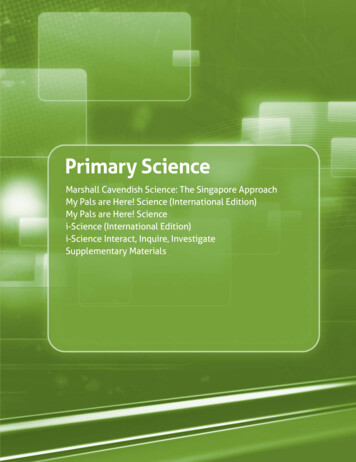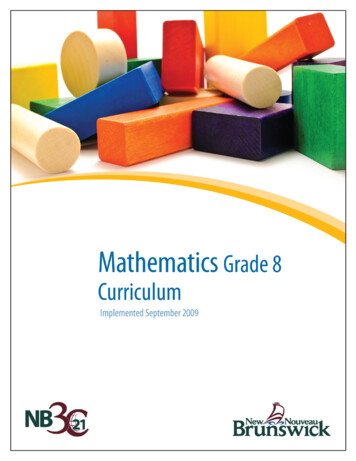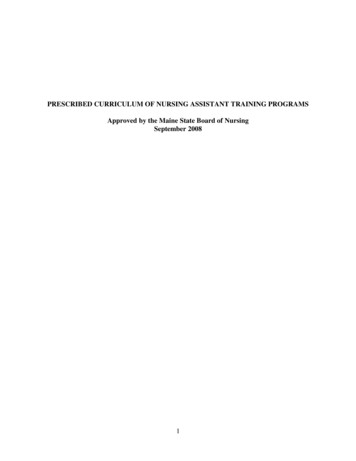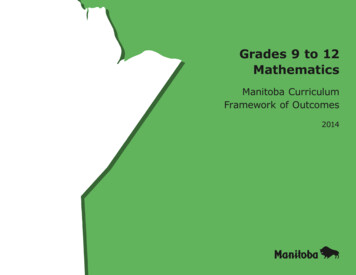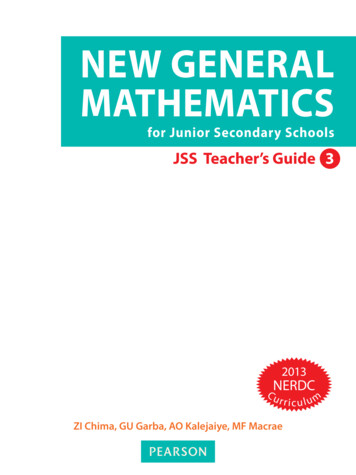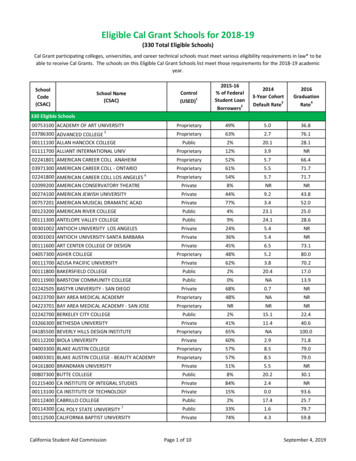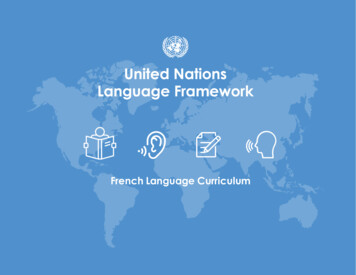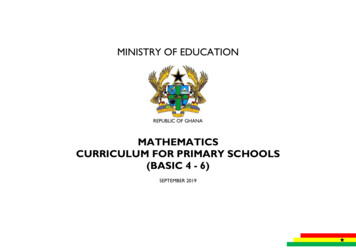
Transcription
MINISTRY OF EDUCATIONREPUBLIC OF GHANAMATHEMATICSCURRICULUM FOR PRIMARY SCHOOLS(BASIC 4 - 6)SEPTEMBER 2019
Mathematics Curriculum for Primary SchoolsEnquiries and comments on this Curriculum should be addressed to:The Executive SecretaryNational Council for Curriculum and Assessment (NaCCA)Ministry of EducationP. O. Box CT PM 77CantonmentsAccraTelephone: 0302909071, 0302909862Email:info@nacca.gov.ghWebsite: www.nacca.gov.gh NaCCA, Ministry of Education 2019ii
FOREWORDThe new curriculum for Ghana’s primary schools is standards-based, which is our demonstration of placing learning at the heart of every classroom and ensuring that everylearner receives quality education. Provision of accessible quality education for all is non-negotiable if we are to meet the human capital needs of our country, required foraccelerated sustainable national development. It is for this reason that the new curriculum sets out clearly the learning areas that need to be taught, how they should betaught and how they should be assessed. It provides a set of core competencies and standards that learners are to know, understand and demonstrate as they progressthrough the curriculum from one content standard to the other and from one phase to the next. The curriculum and its related teachers’ manual promote the use ofinclusive and gender responsive pedagogy within the context of learning-centred teaching methods so that every learner can participate in every learning process and enjoylearning. The curriculum encourages the use of Information and Communication Technologies (ICTs) for teaching and learning – ICTs as teaching and learning materials.The new curriculum has at its heart the acquisition of skills in the 4Rs of Reading, wRiting, aRithmetic and cReativity by all learners. It is expected that at any point of exitfrom a formal education, all learners should be equipped with these foundational skills for life, which are also prerequisites for Ghana becoming a learning nation. Thegraduates from the school system should become functional citizens in the 4Rs and lifelong learners. They should be digital literates, critical thinkers and problem solvers.The education they receive through the study of the learning areas in the curriculum should enable them to collaborate and communicate well with others and beinnovative. The graduates from Ghana’s schools should be leaders with a high sense of national and global identity. The curriculum therefore provides a good opportunityin its design to develop individuals with the right skills and attitudes to lead the transformation of Ghana into an industrialised learning nation.For this reason, the Ministry of Education expects that learners, as a result of the new knowledge, skills and values they have acquired through the new curriculum, willshow a new sense of identity as creative, honest and responsible citizens. These are our core values that underpin the identification and selection of the learning areas forthis curriculum. These core values serve as fundamental building blocks for developing into our learners the spirit of teamwork, respect, resilience and the commitment toachieving excellence. The Ministry endorses a quality learning experience as an entitlement for each of Ghana’s school-going girl and boy; the curriculum has rightlyfocused on learning and learning progression. The Ministry has also endorsed accountability as a critical domain for effective workings of standards-based curriculum.More importantly the role of the teacher is to make this curriculum work for the intended purpose - to inculcate in learners the core competencies and values and tomake learning happen; improve learning outcomes – and the support that teachers need is duly recognised and endorsed by my Ministry. The Ministry will support theimplementation of the curriculum to include capacity development of all teachers in the new curriculum. Teachers matter in the development and delivery of the standardsbased curriculum and we will continue to support our teachers on this journey that we have started together to put learning at the centre of what we do best; teach!I thank all those who have contributed their time and expertise to the development of this curriculum for primary schools in Ghana.Dr. Matthew Opoku Prempeh (MP)The Honourable Minister of Education NaCCA, Ministry of Education 2019iii
TABLE OF CONTENTSFOREWORD . Error! Bookmark not defined.PHILOSOPHY. viGENERAL AIMS . viCORE COMPETENCIES . viiVALUES: .xiiiORGANISATION AND STRUCTURE OF THE CURRICULUM .xviiiBASIC 4 .2STRAND 1: NUMBER . 30STRAND 2: ALGEBRA . 30STRAND 3: GEOMETRY AND MEASUREMENT . 30STRAND 4: DATA . 30BASIC 5 . 55STRAND 1- NUMBER . 55STRAND 2. ALGEBRA . 84STRAND 3: GEOMETRY AND MEASUREMENT . 30STRAND 4: DATA . 107 NaCCA, Ministry of Education 2019iv
BASIC 6 . 114STRAND 1: NUMBER. 114STRAND 2: ALGEBRA . 138STRAND 3: GEOMETRY AND MEASUREMENT . 144STRAND 4: DATA . 151MATHEMATICS SUBJECT PANEL MEMBERS AND REVIEWERS . 162 NaCCA, Ministry of Education 2019v
RATIONALE FOR PRIMARY MATHEMATICSMathematics forms an integral part of our everyday lives. is a universal truth that development is hinged on Mathematics is the backbone of social, economic, political and physicaldevelopment of a country. It is a never-ending creative process which serves to promote discovery and understanding. It consists of a body of knowledge which attempts to explainand interpret phenomena and experiences. Mathematics has changed our lives and is vital to Ghana’s future development.To provide quality Mathematics education, teachers must facilitate learning in the Mathematics classroom. This will provide the foundations for discovering and understanding theworld around us and lay the grounds for Mathematics and Mathematics related studies at higher levels of education. Learners should be encouraged to understand howMathematics can be used to explain what is occurring, predict how things will behave and analyse causes and origins of things in our environment. The Mathematics curriculum hasconsidered the desired outcomes of education for learners at the basic level. Mathematics is also concerned with the development of attitudes. It is important for all citizens to bemathematically and technologically literate for sustainable development. Mathematics therefore ought to be taught using hands-on and minds-on approaches which learners will findas fun and adopt as a culture.PHILOSOPHY Teaching PhilosophyGhana believes that an effective mathematics education needed for sustainable development should be inquiry-based. Thus mathematics education must provide learners withopportunities to expand, change, enhance and modify the ways in which they view the world. It should be pivoted on learner-centred mathematics teaching and learning approachesthat engage learners physically and cognitively in the knowledge-acquiring process in a rich and rigorous inquiry-driven environment. Learning PhilosophyMathematics learning is an active contextualised process of constructing knowledge based on learners’ experiences rather than acquiring it. Learners are information constructorswho operate as researchers. Teachers serve as facilitators by providing the enabling environment that promotes the construction of learners’ own knowledge, based on theirprevious experiences. This makes learning more relevant to the learner and leads to the development of critical thinkers and problem solvers.GENERAL AIMSThe curriculum is aimed at developing individuals to become mathematically literate, good problem solvers, have the ability to think creatively and have both the confidence andcompetence to participate fully in Ghanaian society as responsible local and global citizens.SUBJECT AIMSThe mathematics curriculum is designed to help learners to:1. recognise that mathematics permeates the world around us;2. appreciate the usefulness, power and beauty of Mathematics;3. enjoy Mathematics and develop patience and persistence when solving problems;4. understand and be able to use the language, symbols and notation of Mathematics; and5. develop mathematical curiosity and use inductive and deductive reasoning when solving problems;6. become confident in using mathematics to analyse and solve problems both in school and in real-life situations; NaCCA, Ministry of Education 2019vi
7.8.develop the knowledge, skills and attitudes necessary to pursue further studies in Mathematics; anddevelop abstract, logical and critical thinking and the ability to reflect critically upon their work and the work of others.INSTRUCTIONAL EXPECTATIONS1. Guide and facilitate learning by generating discourse among learners and challenging them to accept and share responsibility for their own learning, based on their uniqueindividual differences.2. Select Mathematics content, adapt and plan lessons to meet the interests, knowledge, understanding, abilities and experiences of learners.3. Work together as colleagues within and across disciplines and grade levels to develop communities of Mathematics learners who exhibit the skills of mathematical inquiryand the attitudes and social values conducive to Mathematics learning.4. Use multiple methods and systematically gather data about learner understanding and ability to guide Mathematics teaching and learning, with arrangements to providefeedback to both learners and parents.5. Design and manage learning environments that provide learners with the time, space and resources needed for learning mathematicsCORE COMPETENCIESThe core competencies for studies describe a body of skills that teachers in Mathematics at all levels should seek to develop in their learners. They are ways in which teachers andlearners in Mathematics engage with the subject matter as they learn the subject. The competencies presented here describe a connected body of core skills that are acquiredthroughout the processes of teaching and learning.CRITICAL THINKING AND PROBLEM SOLVING (CP)This skill develops learners’ cognitive and reasoning abilities to enable them analyse and solve problems. Critical thinking and problem-solving skill enables learners to draw on theirown experiences to analyse situations and choose the most appropriate out of a number of possible solutions. It requires that learners embrace the problem at hand, persevere andtake responsibility for their own learning.CREATIVITY AND INNOVATION (CI)Creativity and Innovation promotes entrepreneurial skills in learners through their ability to think of new ways of solving problems and developing technologies for addressingthe problem at hand. It requires ingenuity of ideas, arts, technology and enterprise. Learners having this skill are also able to think independently and creatively.COMMUNICATION AND COLLABORATION (CC)This competence promotes in learners the skills to make use of languages, symbols and texts to exchange information about themselves and their life experiences. Learners activelyparticipate in sharing their ideas. They engage in dialogue with others by listening to and learning from them. They also respect and value the views of others. NaCCA, Ministry of Education 2019vii
CULTURAL IDENTITY AND GLOBAL CITIZENSHIP (CG)This competence involves developing learners to put country and service foremost through an understanding of what it means to be active citizens. This is done by inculcating inlearners a strong sense of social and economic awareness. Learners make use of the knowledge, skills, COMPETENCIES and attitudes acquired to contribute effectively towardsthe socioeconomic development of the country and on the global stage. Learners build skills to critically identify and analyse cultural and global trends that enable them tocontribute to the global community.PERSONAL DEVELOPMENT AND LEADERSHIP (PL)This competence involves improving self-awareness and building self-esteem. It also entails identifying and developing talents, fulfilling dreams and aspirations. Learners are able tolearn from mistakes and failures of the past. They acquire skills to develop other people to meet their needs. It involves recognising the importance of values such as honesty andempathy and seeking the well-being of others. Personal development and leadership enables learners to distinguish between right and wrong. The skill helps them to fosterperseverance, resilience and self-confidence. PL helps them acquire the skill of leadership, self-regulation and responsibility necessary for lifelong learning.DIGITAL LITERACY (DL)Digital Literacy develop learners to discover, acquire, and communicate through ICT to support their learning. It also makes them use digital media responsibly.LEARNING DOMAINS (EXPECTED LEARNING BEHAVIORS)A central aspect of this curriculum is the concept of three integral learning domains that should be the basis for instruction and assessment. These are- Knowledge, Understanding and Application- Process Skills- Attitudes and Values NaCCA, Ministry of Education 2019viii
KNOWLEDGE, UNDERSTANDING AND APPLICATIONUnder this domain, learners may acquire some knowledge through some learning experiences. They may also show understanding of concepts by comparing, summarising, rewriting etc. in their own words and constructing meaning from instruction. The learner may also apply the knowledge acquired in some new contexts. At a higher level of learningbehaviour, the learner may be required to analyse an issue or a problem. At a much higher level, the learner may be required to synthesize knowledge by integrating a number ofideas to formulate a plan, solve a problem, compose a story, or a piece of music. Further, the learners may be required to evaluate, estimate and interpret a concept. At the lastlevel, which is the highest, learners may be required to create, invent, compose, design and construct. These learning behaviours “knowing”, “understanding”, “applying”, “analysing”,“synthesising”, “evaluating” and “creating” fall under the domain “Knowledge, Understanding and Application”.In this curriculum, learning indicators are stated with action verbs to show what the learner should know and be able to do. For example, the learner will be able to describesomething. Being able to “describe” something after teaching and learning has been completed means that the learner has acquired “knowledge”. Being able to explain, summarise,and give examples etc. means that the learner has understood the concept taught.Similarly, being able to develop, defend, etc. means that the learner can “apply” the knowledge acquired in some new context. You will note that each of the indicators in thecurriculum contains an “action verb” that describes the behaviour the learner will be able to demonstrate after teaching and learning has taken place. “Knowledge, Understandingand Application” is a domain that should be the prime focus of teaching and learning in schools. Teaching in most cases has tended to stress knowledge acquisition to the detrimentof other higher level behaviours such as applying knowledge.Each action verb in any indicator outlines the underlying expected outcome. Each indicator must be read carefully to know the learning domain towards which you have to teach.The focus is to move teaching and learning from the didactic acquisition of “knowledge” where there is fact memorisation, heavy reliance on formulae, remembering facts withoutcritiquing them or relating them to real world – surface learning – to a new position called – deep learning. Learners are expected to deepen their learning by knowledgeapplication to develop critical thinking skills, explain reasoning, and to generate creative ideas to solve real life problems in their school lives and later in their adult lives. This is theposition where learning becomes beneficial to the learner.The explanation and the key words involved in the “Knowledge, Understanding and Application” domain are as follows:Knowing:The ability to remember, recall, identify, define, describe, list, name, match, state principles, facts, concepts. Knowledge is the ability to remember orrecall material already learned and this constitutes the lowest level of learning.Understanding:The ability to explain, summarise, translate, rewrite, paraphrase, give examples, generalise, estimate or predict consequences based upon a trend.Understanding is generally the ability to grasp the meaning of some material that may be verbal, pictorial, or symbolic.Applying:This dimension is also referred to as “Use of Knowledge”. Ability to use knowledge or apply knowledge, apply rules, methods, principles, theories, etc.to situations that are new and unfamiliar. It also involves the ability to produce, solve, plan, demonstrate, discover etc. NaCCA, Ministry of Education 2019ix
Analysis:The ability to break down material/information into its component parts; to differentiate, compare, distinguish, outline, separate, identify significant pointsetc., ability to recognise unstated assumptions and logical fallacies; ability to recognise inferences from facts etc.Synthesising:The ability to put parts together to form a new whole. It involves the ability to combine, compile, compose, devise, plan, revise, organise, create,generate new ideas and solutions etc.Evaluating:The ability to appraise, compare features of different things and make comments or judgment, compare, contrast, criticise, justify, support, discuss,conclude, make recommendations etc. Evaluation refers to the ability to judge the worth or value of some material based on some criteria.Creating:The ability to use information or materials to plan, compose, produce, manufacture or construct other products. From the foregoing, creation is thehighest form of thinking and learning skill and is therefore the most important behaviour. This unfortunately is the area where most learners performpoorly. In order to get learners to develop critical thinking and behavioural skills beginning right from the lower primary level, it is advised that you doyour best to help your learners to develop analytic and application skills as we have said already.SKILLS AND PROCESSESThe mathematical method is the means by which a mathematician solves problems or seeks to gain information about events. Learners should be exposed to situations thatchallenge them to raise questions and attempt to solve problems. The more often they are faced with these challenges, the more likely they are to develop a positive attitudetoward mathematics, and the more likely they are to develop the relevant process skills. Details of each sub-skill in the “Values, Attitudes and Process Skills” dimension are asfollows:ObservingThis is the skill of using our senses to gather information about objects or events. This also includes the use of instruments to extend the range of oursenses.ClassifyingThis is the skill of grouping objects or events based on common characteristicsComparingThis is the skill of identifying the similarities and differences between two or more objects, concepts or processes.Communicating/ This is the skill of transmitting, receiving and presenting information in concise, clear and accurate forms verbal, written, pictorial, tabular orReporting graphicalPredictingThis is the skill of assessing the likelihood of an outcome based on prior knowledge of how things usually turn out.AnalysingThis is the skill of identifying the parts of objects, information or processes, and the patterns and relationships between these parts. NaCCA, Ministry of Education 2019x
Generating /possibilitiesThis is the skill of exploring all the options, possibilities and alternatives beyond the obvious or preferred one.EvaluatingThis is the skill of assessing the reasonableness, accuracy and quality of information, processes or ideas. This is also the skill of assessing the quality andfeasibility of objects.DesigningThis is the skill of Visualizing and drawing new objects or gargets from imaginationMeasuringThis is the skill of using measuring instruments and equipment for measuring, reading and making observationsInterpretingThis is the skill of evaluating data in terms of its worth: good, bad, reliable, unreliable; making inferences and predictions from written or graphical data;extrapolating and deriving conclusions. Interpretation is also referred to as “Information Handling”.RecordingThis is the skill of drawing or making graphical representation boldly and clearly, well labelled and pertinent to the issue at hand.GeneralisingThis is the skill of being able to use the conclusions arrived at in an experiment to what could happen in similar situationsDesigning ofExperimentsThis is the skill of developing hypotheses; planning and designing of experiments; persistence in the execution of experimental activities;modification of experimental activities where necessary in order to reach conclusions. Learners therefore need to acquire positive attitudes,values and psychosocial skills that will enable them participate actively in lessons and take a stand on issues affecting them and others. NaCCA, Ministry of Education 2019xi
ATTITUDESTo be effective, competent and reflective citizens, who will be willing and capable of solving personal and societal problems, learners should be exposed to situations that challengethem to raise questions and attempt to solve problems. Learners therefore need to acquire positive attitudes, values and psychosocial skills that will enable them participate indebates and take a stand on issues affecting them and others. The mathematics curriculum thus focuses on the development of attitudes and values.The mathematics curriculum aims at helping learners to acquire the following:(i)Commitment: determination to contribute to national development.(ii)Tolerance: willingness to respect the views of others.(iii)Patriotism: readiness to defend the nation.(iv)Flexibility in ideas: willingness to change opinion in the face of more plausible evidence.(v)Respect for evidence: willingness to collect and use data on one’s investigation, and also have respect for data collected by others.(vi)Reflection: the habit of critically reviewing ways in which an investigation or observation has been carried out to see possible faults and other ways in which theinvestigation or observation can be improved upon.(vii)Comportment conforming to acceptable societal norms.(viii)Co-operation the ability to work effectively with others.(ix)Responsibility: the ability to act independently and make decisions; morally accountable for one’s action; capable of rational conduct.(x)Environmental Awareness: being conscious of one’s physical and socio-economic surroundings.(xi)Respect for the Rule of Law: obeying the rules and regulations of the land.The teacher should ensure that learners cultivate the above attitudes and skills as basis for living in the nation as effective citizens. NaCCA, Ministry of Education 2019xii
VALUES:At the heart of this curriculum is the belief in nurturing honest, creative and responsible citizens. As such, every part of this curriculum, including the related pedagogy should beconsistent with the following set of values.Respect: This includes respect for the nation of Ghana, its institutions and laws and the culture and respect among its citizens and friends of Ghana.Diversity: Ghana is a multicultural society in which every citizen enjoys fundamental rights and responsibilities. Learners must be taught to respect the views of all persons andto see national diversity as a powerful force for nation development. The curriculum promotes social cohesion.Equity: The socio-economic development across the country is uneven. Consequently, it is necessary to ensure an equitable distribution of resources based on the unique needs oflearners and schools. Ghana’s learners are from diverse backgrounds, which require the provision of equal opportunities to all, and that all strive to care for each other bothpersonally and professionally.Commitment to achieving excellence: Learners must be taught to appreciate the opportunities provided through the curriculum and persist in doing their best in whatever fieldof endeavour as global citizens. The curriculum encourages innovativeness through creative and critical thinking and the use of contemporary technology.Teamwork/Collaboration: Learners are encouraged to be become committed to team-oriented working and learning environments. This also means that learners should have anattitude of tolerance to be able to live peacefully with all persons.Truth and Integrity: The curriculum aims to develop learners into individuals who will consistently tell the truth irrespective of the consequences. In addition, be morally uprightwith the attitude of doing the right thing even when no one is watching. Also, be true to themselves and be willing to live the values of honesty and compassion. Equally important,the ethos or culture of the work place, including integrity and perseverance, must underpin the learning processes to allow learners to apply skills and COMPETENCIES in theworld of work.The action verbs provided under the various profile dimensions should help you to structure your teaching to achieve desired learning outcomes. Select from the action verbsprovided for your teaching, for evaluation exercises and for test construction. Check the weights of the profile dimensions to ensure that you have given the required emphasis toeach of the dimensions in your teaching and assessment. NaCCA, Ministry of Education 2019xiii
ASSESSMENTAssessment is a process of collecting and evaluating information about learners and using the information to make decisions to improve their learning.In this curriculum, it is suggested that assessment is used to promote learning. Its purpose is to identify the strengths and weaknesses of learners to enable teachers ascertain theirlearner’s response to instruction.Assessment is both formative and summative. Formative assessment is viewed in terms of Assessment as learning and Assessment for learning.Assessment as learning: Assessment as learning relates to engaging learners to reflect on the expectations of their learning. Information that learners provide the teacher forms thebasis for refining teaching-learning strategies. Learners are assisted to play their roles and t
considered the desired outcomes of education for learners at the basic level. Mathematics is also concerned with the development of attitudes. It is important for all citizens to be mathematically and technologically literate for sustainable development. Mathematics therefore ought to b



